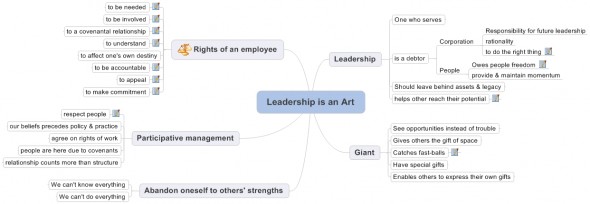“The art of leadership is about liberating people to do what is required of them in the most effective and humane way possible”. This is how Max De Pree explains what is leadership in introduction of his book “Leadership is an art”. The book is listed as a must read for every businessman struggling with the challenges of competing market, since its first edition was published in 1989. By today it has been sold over 800,000 copies, and Max De Pree become one of the bestselling American authors when it comes to the topic of leadership and has developed his own Center of leadership, promoting so called “relational leadership”.
As CEO of Herman Miller Inc., Max DePree writes from his own experience and authority. The book is easy to read, and I found it elegantly-written piece, as the author sets out the goals and principles of leadership and explains how his leadership philosophy and management techniques helped build Herman Miller into 100 best American companies to work for.
The most important aspect of leadership, believes De Pree, is to recognize the potential of the staff. Everyone should be part of the decision-making process and all information should be shared with the workforce.
“The measure of leadership is not the quality of the head, but the tone of the body. The signs of outstanding leadership appear primarily among the followers. Are the followers reaching their potential? Are they learning? Serving? Do they achieve the required results? Do they change with grace? Manage conflict?” says De Pree, in introduction chapter: What is leadership?
One of the first and most important lessons businessman should learn is to recognize diversity throughout its organization. Diversity in this context means that everyone brings different gifts, talents, and skills to an institution. Since leaders can’t know and do everything, they have to rely on and create trust environment that everyone can contribute to the same goal with their unique skill-set.
Additionally authors lists 8 essential workers rights: 1. The right to be needed; 2. The right to be involved.; 3. The right to covenantal relationship; 4. The right to understand; 5. The right to affect one’s own destiny; 6. The right to be accountable; 7.The right to appeal; 8. The right to make a commitment.
As every leader reaches to a point in his career questioning what is the best way to lead, De Pree offers an answer stating that “the best management process for today’s environment is participative management based on covenantal relationships.” A contractual relationship often breaks down under the conflict, and it doesn’t enable us to reach our potential. On the other side, covenantal relationships induce freedom, not paralysis, as it rests on shared commitment to ideas, goals, values and management processes, says De Pree.
He stresses out the importance of a good communication, as an art of leadership is to keep common bond of interdependence, mutual interest and a simple joy. And the best communication forces us to listen. De Pree even raises a question of communication as an ethical, as “a good communication means a respect for individuals.” I especially liked his sentence “without effective communication, actively practiced, without the art of scrutiny, those values will disappear in the sea of trivial memos and impertinent reports.”
In sum, a true leader is a listener. The leader listens to the ideas, needs, aspirations, and wishes of the followers. The book is a must-read for professionals coming from business community, academia, or politics. Especially for those who see leadership as stewardship, putting emphasis on the importance of building relationships, and initiating ideas.
@majacakarun



Thank you for sharing this with us. It is interesting to head the leadership perspective of someone who comes from a design background.
Do you think that this creative mind’s leadership style would differ from someone in a more traditional business setting?
I believe there is no difference which industry company belongs. Although, he talks about his own experience, his leadership principles are universally applicable. De Pree is a successful businessman, which makes him trustworthy to give advice on management. That’s why any business community can benefit from it.
I loved your presentation! There were some great quotes. This is definitely a book I would read.
Your first quote “The art of leadership is about liberating people to do what is required of them in the most effective and humane way possible,” reminds me of many of the ideas in Tribes. I think you books idea about efficient liberation goes hand in hand with my books idea of change being good!
Thanks! It is a kind of tribal, and he even says in a book that leadership is more tribal than scientific, more weaving of relationships than an amassing of information.